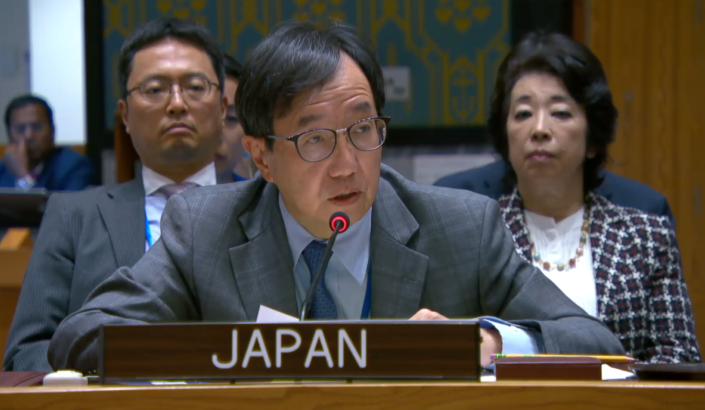Statement by H.E. Ambassador YAMAZAKI Kazuyuki, Permanent Representative of Japan to the United Nations, at the United Nations Security Council Open Debate on “Women Building Peace in a Changing Environment”
2024/10/24

(As delivered)
Thank you, Madam President.
I thank Switzerland for convening this meeting, Open Debate, and Her Excellency, President Amherd, for chairing this debate. I also thank the Deputy Secretary-General, the Executive Director of UN Women, Justice Owuor, and Ms. Nu for their comprehensive briefings.
Since the adoption of the Security Council resolution 1325 in 2000, there has been some progress in promoting the women, peace and security (WPS) agenda globally. However, as the Secretary-General’s report warns, we are concerned about the insufficient progress on this agenda, as well as stagnation and regression across key indicators, including escalating backlash against women’s rights and gender equality across the world.
Madam President,
As emphasized by the Secretary-General’s report, ensuring the effective implementation of existing frameworks remains one of the most urgent needs for advancing the WPS agenda. Despite progress, much remains to be done, particularly ensuring women’s full, equal, and meaningful participation in peace processes.
In this regard, Japan has made concrete steps of its own. Since the adoption of our first National Action Plan in 2015, Japan has implemented the plan in a steadfast manner through specifying targets and designating responsible ministries and agencies.
This year, Japan has strengthened our efforts by establishing a cross-organizational WPS task force within the Ministry of Foreign Affairs to enhance coordination and transparency. This task force collaborates closely with other related ministries and agencies, including the Ministry of Defense and the Fire and Disaster Management Agency.
We have also put in place mechanisms for annual progress reporting, which are evaluated by experts and civil society organizations. This ensures accountability and helps further the effective implementation of our National Action Plan.
Madam President,
Globally, 110 countries and territories have adopted National Action Plans on WPS as of June this year. We encourage more countries to adopt a national plan and strengthen it with adequate resources and monitoring mechanisms.
I am also pleased to share that Japan joined the “Common Pledge on women’s participation in peace processes,” led by the Secretary-General. We hope that this pledge will help accelerate the existing frameworks related to the WPS agenda.
Madam President,
Japan believes that holistic empowerment of women that includes the elimination of existing gender-inequality will ultimately contribute to the participation of women in peace processes. In this regard, allow me to share a few examples from our global initiatives, leveraging new technologies to promote women’s empowerment.
In Madagascar, Japan supported a UNFPA project to provide life-saving sexual and reproductive health, family planning, and integrated knowledge and services that are related to gender-based violence for the most vulnerable and underserved women and girls in hard-to-reach areas in southern Madagascar, using new technologies such as drones for health care commodities delivery and an order management system. Through this project, essential sexual and reproductive health supplies were delivered via drones to remote communities and health centers.
Ensuring economic security of women affected by conflicts is another key aspect of the WPS agenda. In Poland, our aid agency JICA, has provided IT training for displaced populations from Ukraine at the Polish-Japanese Academy of Information Technology. More than 80% of participants were women, and this training has led to actual employment. This initiative aims to offer enhanced livelihoods for Ukrainian women and also to contribute to the economy of host country Poland.
Madam President,
As a member of the WPS Shared Commitments, Japan has been committed to the WPS agenda both within the Council and across the UN system. The WPS agenda has become one of the main pillars of Japan’s foreign policy, and in 2025, Japan will co-chair the WPS Focal Points Network with Norway, hosting the Capital Level Meeting in Tokyo in February. Through all these efforts, we will endeavor together with the partners in the international community to enhance women’s participation and engagement in the WPS relevant processes in a truly substantive way. Japan will remain firmly committed to advancing the WPS agenda together with Member States, UN agencies, CSOs and other stakeholders.
I thank you.
